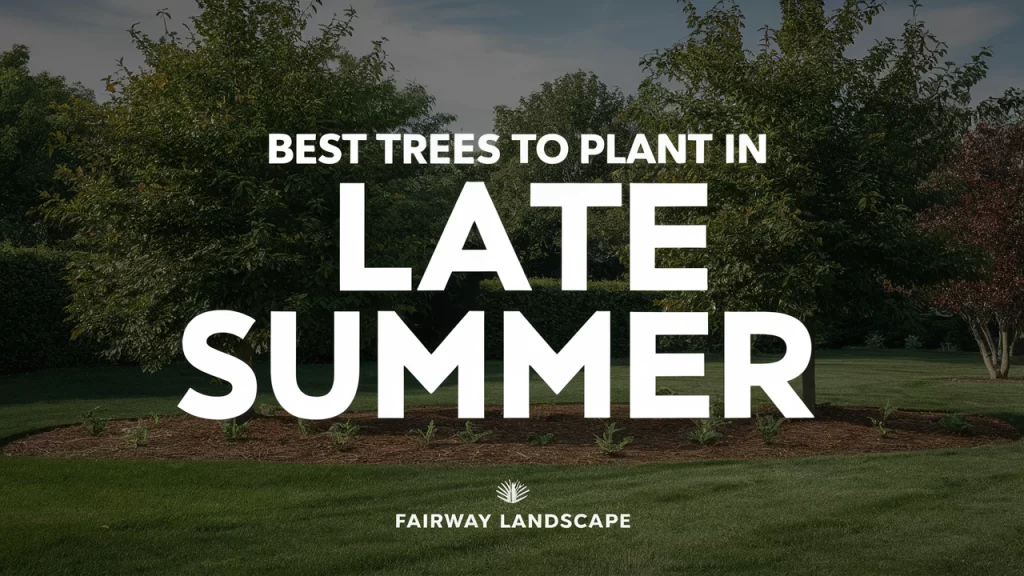Planting trees in late summer offers a unique set of benefits for both the tree and the gardener. As the intense heat of summer begins to wane, the soil remains warm, allowing for optimal root growth and establishment before the cooler temperatures of fall and winter set in. This article will explore the best tree species to plant in late summer, focusing on trees that provide vibrant fall color, year-round greenery, edible harvests, and support for local ecosystems.

Section 1: Benefits of Late Summer Planting
Why Late Summer is Ideal for Tree Planting
Planting trees in late summer offers several advantages that can help ensure the success and longevity of your new additions. Here are some key benefits of late summer tree planting:
- Warm soil temperatures: The warm soil in late summer promotes rapid root growth, allowing trees to establish a strong foundation before winter.
- Reduced stress from summer heat: As temperatures begin to cool in late summer, newly planted trees experience less heat stress, making it easier for them to adapt to their new environment.
- Better root establishment before winter: Planting in late summer gives trees ample time to develop a robust root system before the ground freezes, improving their chances of survival through the winter months.
For more information on seasonal planting tips, check out our previous blog post: The Best Times to Plant Trees, Shrubs, and Perennials.
Section 2: Deciduous Trees for Fall Color
Enhancing Your Landscape with Fall Color
Deciduous trees that display brilliant fall foliage are an excellent choice for late summer planting. As the leaves change color in autumn, these trees will add a stunning visual interest to your landscape. Some of the best deciduous trees for fall color include:
- Red Maple: Known for its vibrant red fall foliage, the Red Maple is a fast-growing tree that adapts well to various soil conditions.
- Sugar Maple: This classic shade tree boasts stunning orange, yellow, and red fall colors, making it a popular choice for many landscapes.
- Ginkgo: With its unique fan-shaped leaves that turn a brilliant golden-yellow in fall, the Ginkgo tree is a distinctive and low-maintenance option.
When planting deciduous trees, be sure to choose a spot with adequate sunlight and well-draining soil. Fairway Landscaping offers professional tree planting and care services to help you select and establish the perfect trees for your landscape.
Section 3: Evergreen Trees for Year-Round Greenery
Choosing Evergreens for Year-Round Appeal
Evergreen trees provide a constant source of greenery throughout the year, offering privacy, wind protection, and visual interest in your landscape. Some popular evergreen trees to consider for late summer planting include:
- Arborvitae: These tall, narrow evergreens are perfect for creating privacy screens or hedges, with soft, feathery foliage that maintains its color year-round.
- Spruce: Available in a variety of sizes and colors, spruce trees are known for their pyramidal shape and dense, needle-like foliage.
- Pine: With their long, slender needles and distinctive pine cones, pine trees add a classic, rugged beauty to any landscape.
When planting evergreens, consider their mature size and space requirements to ensure they have room to grow. Read more about evergreen landscaping in our previous blog post: 10 Evergreen Trees and Shrubs for Year-Round Interest.
Section 4: Fruit Trees for Edible Landscapes
Incorporating Fruit Trees into Your Garden
Late summer is an ideal time to plant fruit trees, as it allows them to establish strong roots before the following growing season. Incorporating fruit trees into your landscape not only provides a source of fresh, homegrown produce but also adds beauty and interest to your garden. Some popular fruit trees to consider include:
- Apple: With countless varieties available, apple trees can be selected for their fruit flavor, ripening time, and disease resistance.
- Pear: Pear trees offer delicious fruit and attractive spring blossoms, making them a versatile addition to any edible landscape.
- Plum: Both European and Japanese plum varieties can be planted in late summer, providing a bounty of sweet or tart fruits.
When selecting fruit trees, choose varieties that are well-suited to your climate and have pollination requirements that can be met in your garden. Fairway Landscaping’s edible landscaping services can help you create a beautiful and bountiful fruit tree garden.
Section 5: Native Trees for Local Ecosystems
Supporting Local Ecosystems with Native Trees
Planting native tree species is an excellent way to support local ecosystems and promote biodiversity in your landscape. Native trees are well-adapted to the climate and soil conditions of your area, making them easier to maintain and more resistant to pests and diseases. Some native trees to consider for late summer planting include:
- Oak: With their majestic size and long lifespans, oak trees provide shelter and food for countless wildlife species.
- Dogwood: Known for their showy spring flowers and attractive fall foliage, dogwood trees are a popular choice for wildlife gardens.
- Eastern Redbud: This small, ornamental tree boasts vibrant pink flowers in spring and heart-shaped leaves that turn golden-yellow in fall.
When planting native trees, be sure to choose species that are well-suited to your specific region and site conditions. Learn more about the benefits of native plants in our blog post: Why Native Plants are Essential for a Thriving Ecosystem.
Conclusion
Late summer is an ideal time to plant a variety of trees, from those that offer vibrant fall color to evergreens that provide year-round interest. Fruit trees and native species are also excellent choices for late summer planting, as they contribute to edible landscapes and support local ecosystems. By selecting the right trees and providing them with proper care, you can enhance the beauty and diversity of your landscape for years to come.
For expert assistance in selecting and planting the perfect trees for your landscape, contact Fairway Landscaping today at (443) 206-0221 or visit our contact page to schedule a consultation with our experienced team of tree planting professionals.
